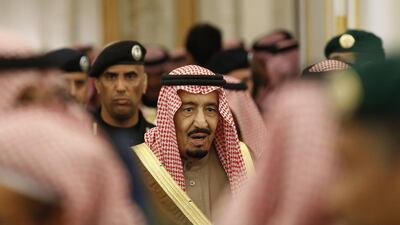Israel’s president Reuven Rivlin and his predecessor, Shimon Peres, were notable voices in the chorus of world leaders who paid tribute to Saudi Arabia’s King Abdullah last week. Mr Rivlin praised his leadership, vision and “contribution to the stability of the Middle East”.
That’s not just rhetoric. The Israelis genuinely believe that their common hostility to Iran and to the Muslim Brotherhood gave Israel and Saudi Arabia a mutual interest that trumped any concern in Riyadh for the fate of the Palestinians.
During last summer’s bombardment of Gaza, Israel’s media was full of reports implying that the military offensive had the backing of Egypt’s Abdel Fattah El Sisi, and also of his Saudi patrons, both of whom wanted Hamas destroyed.
Benjamin Netanyahu also spoke cryptically of a “new reality” in the region that allowed Israel the freedom to act as it had done in Gaza. But despite any tactical convergence prompted by hostility to Iran and political Islam, the Saudis could not make common cause with Israel in the absence of a political settlement to the Palestinian conflict.
King Abdullah came from a generation of Arab leaders who viewed Israel’s expansion at the expense of millions of Palestinians as a humiliation. His father, King Abdulaziz Ibn Saud, had implored Franklin D Roosevelt to prevent the “evicting [of] the Arabs from their home” by creating a Jewish state in Palestine.
The Saudis supported the US-led effort to resolve the Israeli-Palestinian conflict through the Oslo peace process. When that process broke down after the 2000 Camp David talks, the onset of the Second Intifada prompted the George W Bush administration to embrace the rejectionism of Ariel Sharon. In response, then-Crown Prince Abdullah travelled to Mr Bush’s ranch, showing him gory photographs of the impact of Sharon’s violent crackdown on Palestinians.
He convinced Mr Bush to launch further attempts at promoting negotiations and introduced his own Arab Peace Initiative, adopted by the Arab League, offering a full normalisation of ties with Israel in exchange for a withdrawal to allow the creation of a Palestinian state based on the 1967 borders with East Jerusalem as its capital, and a just solution of the refugee issue.
But the Israeli leadership was not interested, because it had little incentive to end an occupation for which – under Mr Bush and then later Mr Obama – it suffered no consequences, simply hand-wringing statements by US officials.
The Arab rebellion that broke out early in 2011 saw Saudi Arabia follow Israel’s example of ignoring its US ally. King Abdullah was incensed that the Obama administration allowed a longtime ally, Hosni Mubarak, to be ousted, and then quickly reconciled itself with Muslim Brotherhood rule in Cairo.
The kingdom responded by backing the counter-revolution that eventually brought Mr El Sisi to power – another instance in which they found themselves on the same side as Israel.
As the US watched from the sidelines, the Saudis rallied their allies to push back hard against the Muslim Brotherhood and its backers, and against Iran and its allies. King Abdullah was incensed by Mr Obama's failure to act on his threat to bomb the Syrian regime of Bashar Al Assad if it used chemical weapons.
And Saudi officials, more discreetly than their Israeli counterparts, also lobbied the US and other Western powers to harden their stance on Iran’s nuclear programme.
The US failure in Iraq marked a turning point for Washington’s involvement in the region, with the trend since then of steady disengagement. And so, where the Saudis and Israelis once found themselves competing to influence Washington on the question of the Palestinians, both now find themselves crafting their regional strategies independently of the US.
But even if Israel and Saudi Arabia have seen their short-term interests coincide in Egypt, the Palestinian Territories, and in response to US rapprochement with Iran, Mr Netanyahu's vision of a long-term alliance between them remains a fantasy.
Regional events of recent years have pushed the Palestinian issue onto the back burner, but it won’t stay there forever. Mr Netanyahu has made clear that Israel has no intention of ever accepting an independent Palestinian state on the West Bank, and Israel has never accepted the Arab Peace Initiative.
As long as the occupation continues, episodic bouts of violence such as last summer’s Israeli bombardment of Gaza will make it politically impossible for the Saudis to embrace Israel. And while the Saudis support the removal of Mr Al Assad in Syria, the Israelis appear to prefer him to the alternative.
Even if the Saudis have bent the stick in recent years in backing change in Egypt, supporting those fighting Iran’s allies in Syria and Lebanon and pushing a hard line on diplomacy with Tehran, Riyadh ultimately needs regional stability, and that will eventually require reconciliation among contending powers. The current season of confrontation between the Saudis and Iranians will give way to the search for a new modus vivendi, because neither is served ultimately by sustained chaos in the region. For the same reason, the House of Saud will ultimately see the need for reconciliation in Arab polities currently stretched by violence and discord.
And that’s where the kingdom’s interests differ fundamentally from Israel’s, because, as Mr Netanyahu has demonstrated and even said, the Israeli leadership sees chaos across the Arab world as favouring its strategic interests.
Tony Karon teaches in the graduate programme at the New School in New York

